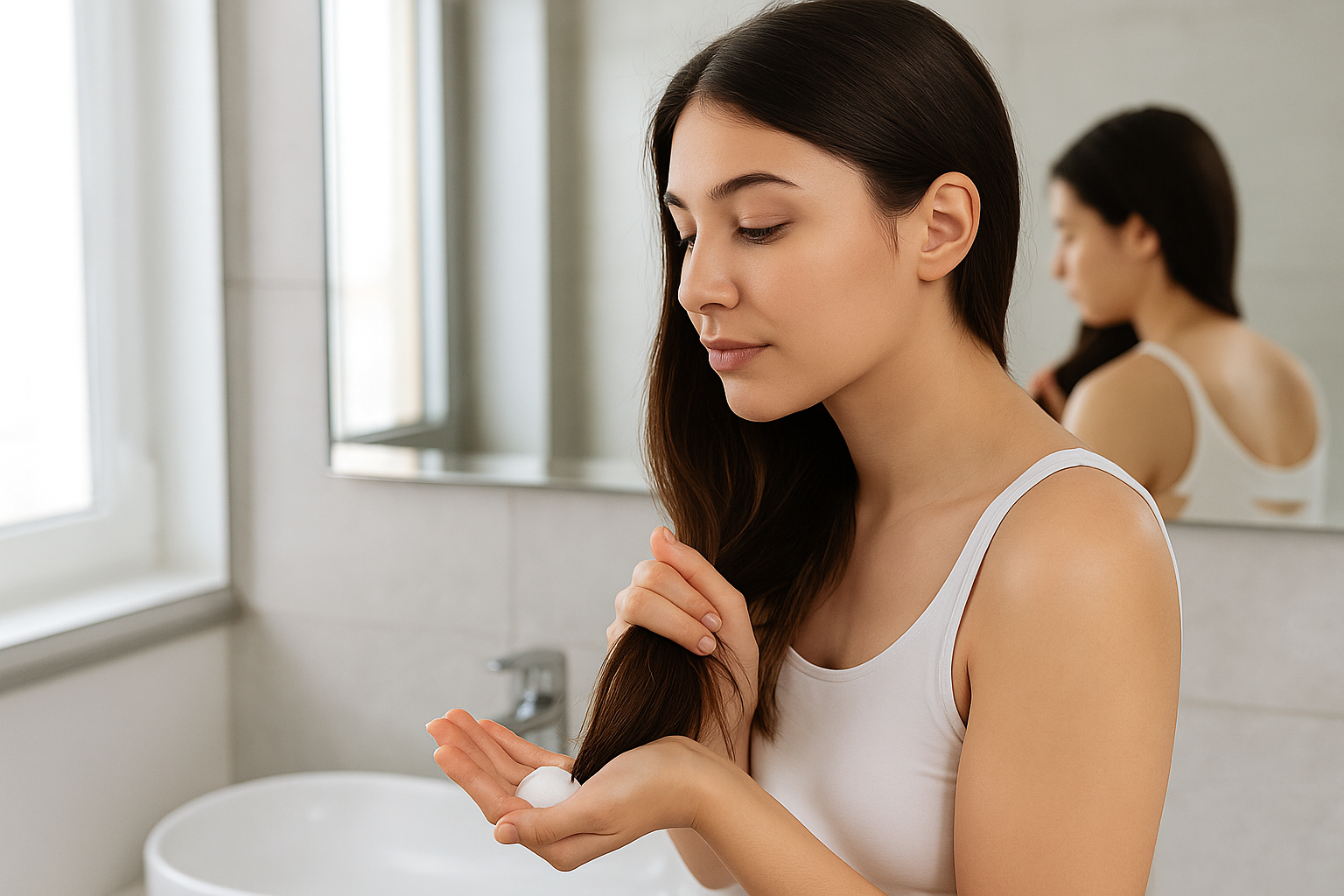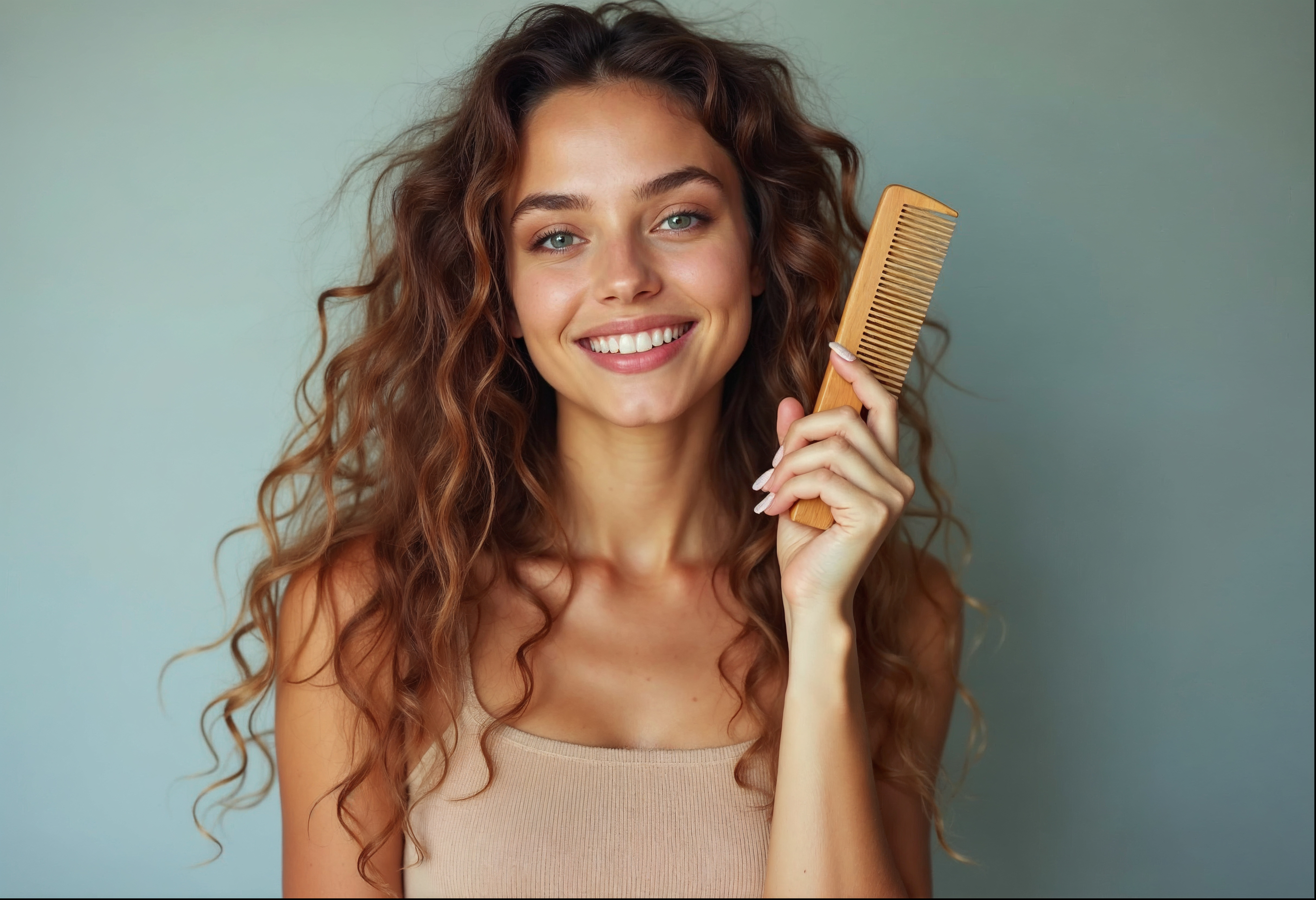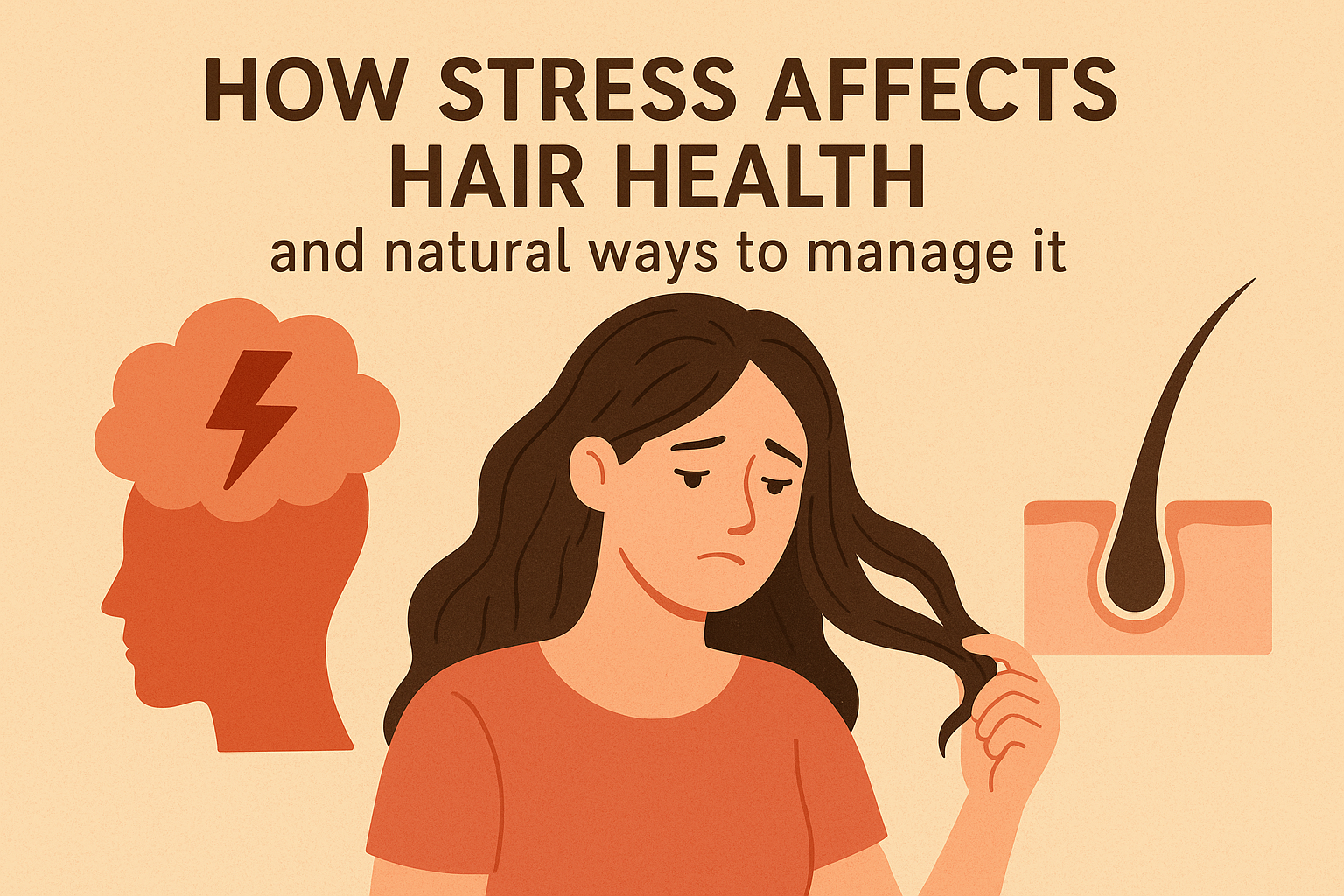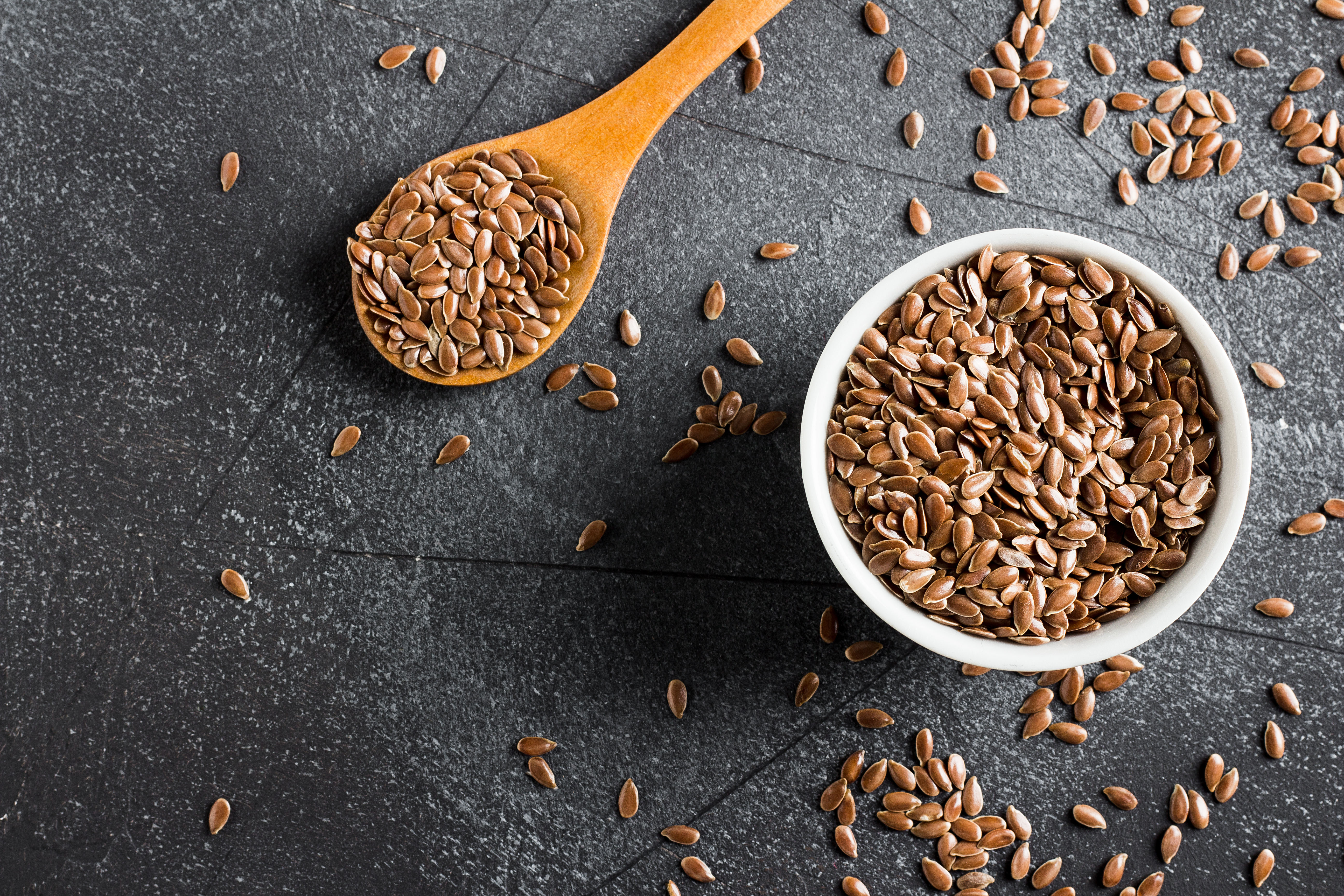If you’ve noticed more strands in your brush after a tough season, you’re not imagining it. Stress is one of the most common, under-recognized triggers behind thinning and excessive shedding. The connection between stress and hair loss is real: when your body stays in “alert” mode, your scalp’s delicate growth cycle can falter, follicles can become less active, and strands may shed faster than they’re replaced. The encouraging part? Most hair fall due to stress is temporary and often reversible with a calm, consistent plan.
This guide explains the effects of stress on hair, how different types of stress show up on your scalp, and exactly what to do, naturally, to restore balance. You’ll also get a food plan, a daily routine, and clear expectations about timelines so you can rebuild healthy density and shine without guesswork.
Also Read: How to Use Flaxseeds for Healthier, Shinier Hair
Prepping Yourself to Address Stress-Related Hair Changes
Before you jump into solutions, set yourself up to choose the right ones:
1: Map your stressors: Note the top three pressure points in your life (workload, caregiving, finances, sleep). Match them to any hair changes you’ve seen in the last 8–12 weeks; the effects of stress on hair are often delayed.
2: Do a quick health inventory: Track sleep quality, hydration, and meal regularity for two weeks. Inconsistent basics can significantly magnify stress and lead to hair loss.
3: Spot the pattern of shedding: Diffuse thinning across the scalp points to telogen effluvium, while round patches suggest alopecia areata. Habitual picking or pulling indicates trichotillomania, another form of hair loss due to stress.
4: Check haircare habits: Heat, harsh detergents, and tight styles worsen shedding during high-stress periods.
5: Plan realistic changes: Choose 1–2 stress tools (breathwork + bedtime routine, for instance) and 1–2 scalp tools (oil massage + gentle shampoo). A slow, steady approach usually wins out over a total life overhaul.
Also Read: Difference Between Temporary and Permanent Hair Loss Explained
How Stress Disrupts the Hair Cycle (and What That Looks Like)
Hair grows in repeating phases: anagen (growth), catagen (transition), telogen (rest), and exogen (shedding). Chronic stress shifts more follicles into rest and shedding, creating visible volume loss.
1) Cortisol on Overdrive
Stress that drags on for days or weeks makes your system pump out extra cortisol, the body’s main stress signal. Too much for too long can cut the hair’s growth stage short, slow the start of new strands, and stir up scalp inflammation. Over weeks, ponytails feel smaller and part lines look wider, classic signs tying stress and hair loss together.
2) Less Blood Flow to the Scalp
When the body is under stress, it directs blood flow first to vital organs. When hair follicles receive less oxygen and fewer nutrients, hair may lose its shine, grow more slowly, and become brittle at the ends.
3) Immune Misfires
Emotional strain can coincide with autoimmune activity against follicles (alopecia areata). This typically shows up as smooth, round patches and may wax and wane with life stressors.
4) Behavioral Loops
With trichotillomania, pulling hair momentarily relieves tension but causes uneven loss and damaged stubble. This is a direct form of hair fall due to stress that benefits from both habit tools and soothing routines.
Early Warning Signs You Should Act On
1: Excess hair on pillows, shower drains, or brushes
2: Reduced ponytail circumference over 1–3 months
3: Widening part or more visible scalp under bright light
4: Short “baby hairs” around the hairline without overall density returning
5: Tender or tight scalp sensations during high-stress weeks
Acting early lets you reverse the effects of stress on hair faster.
Also Read: Is It Bad to Sleep with Wet Hair?
Natural Ways to Reduce Stress and Support Regrowth
Mind-Body Reset (Your Core Routine)
1: Box breathing (5 minutes, a.m. & p.m.)
Inhale 4, hold 4, exhale 4, hold 4, repeat. Regular breathwork switches your body from “fight-or-flight” to “rest-and-repair,” easing the loop between stress and hair loss.
2: Gentle movement (20–30 minutes daily)
Yoga, walking, or tai chi improves circulation and mood without spiking stress hormones.
3: Micro-breaks every hour and a half
Spending two minutes to stand, stretch, and drink water can relieve accumulated tension and help prevent hair fall caused by stress.
4: A nightly wind-down cue
Dim the lights, switch off screens, take a warm shower, then read or journal. A predictable signal primes deeper sleep and faster follicle recovery.
Scalp-First Care: Calm + Circulation
1: Warm oil massage, 2–3 times a week
Coconut, almond, or jojoba oil all work well. For an extra boost, mix in a drop or two of rosemary or peppermint oil for each teaspoon of carrier. Massage for about 5-10 minutes to encourage circulation, ease tightness, and support growth.
2: Mild cleanser, no harsh detergents
Go for a gentle, sulfate-free shampoo. Washing too often can dry the scalp; too rarely can lead to clogged follicles. Find a comfortable balance that keeps the scalp clean without stripping it.
3: Hands-off styling
Skip tight ponytails, heavy extensions, and frequent high heat while reversing stress and hair loss.
4: Weekly conditioning ritual:
Once weekly, apply a nourishing hair mask from mid-lengths to ends; rinse cool to seal.
Also Read: Is It Bad to Sleep with Wet Hair? Here’s the Truth
Nutrition to Steady Nerves and Feed Hair Roots
Hair roots are hungrier than we think; they rely on steady protein and a variety of micronutrients to stay strong. If your meals are balanced, your strands will thank you.
1: Protein power: Eggs, Greek yogurt, paneer or tofu, lentils, fish, or lean chicken. Include a palm-sized serving at each main meal.
2: Iron meets vitamin C: Combine spinach or lentils with fresh lemon, tomatoes, or bell peppers so your body can actually absorb the iron and send oxygen to follicles.
3: Zinc & selenium picks: A few nuts (especially Brazil nuts), a sprinkle of pumpkin seeds, or a serving of seafood can help repair hair tissue.
4: Omega-3s for calm: Fatty fish, walnuts, or a spoon of chia/flax can ease scalp inflammation.
5: B-vitamin helpers: Whole grains, greens, and eggs all support the energy pathways that power new growth.
6: Don’t forget water: Even mild dehydration can make stress-related shedding worse, so sip steadily through the day.
Better Sleep, Light, and Daily Rhythm
1: Aim for 7–9 hours: Your body does most of its repair work while you’re sleeping, including tiny fixes to hair follicles. Keeping bedtime and wake-up times consistent helps regulate stress hormones.
2: Catch the morning sun: Ten to fifteen minutes of natural light soon after waking can help your body clock run on time, which in turn supports deeper sleep at night.
3: Mind your caffeine intake: Avoiding coffee or tea before early afternoon can help you avoid the “wired but tired” feeling that disrupts rest and, indirectly, hair health.
Build a Stress-Smart Hair Plate (Practical Food Ideas)
Breakfast
1: Veggie omelet + whole-grain toast + orange wedges
2: Greek yogurt with berries, chia, and a drizzle of honey
3: Tofu scramble with spinach and tomatoes + avocado
Lunch
1: Quinoa bowl with chickpeas, cucumber, herbs, olive oil, and lemon
2: Grilled fish with brown rice and steamed broccoli
3: Lentil salad with roasted pumpkin seeds and peppers
Also Read: What vitamin deficiency causes hair fall the most?
Snack
1: A handful of walnuts + an apple
2: Hummus with carrots and cucumbers
3: Cottage cheese or paneer cubes with cherry tomatoes
Dinner
1: Baked salmon or trout, sweet potato, and asparagus
2: Stir-fried tofu with mixed veggies over soba noodles
3: Chicken and spinach khichdi with a side salad
These combos steady blood sugar, reduce cravings, and supply follicle-relevant nutrients that offset the effects of stress on hair.
A Daily Routine to Break the Cycle
Morning (10–20 minutes)
1: Box breathing or short meditation
2: Light mobility or yoga sun salutations
3: Protein-rich breakfast + water
Midday (5–10 minutes, twice)
1: Stretch break, short outdoor walk, sunlight
2: Tall glass of water or herbal tea
Evening (15–25 minutes)
1: Gentle scalp massage (oil on alternate days)
2: Warm shower; apply leave-in conditioner if needed
3: Screen-free reading or journaling
Night (8 hours total)
1: Set a consistent bedtime
2: Cool, dark room; phone outside the bedroom
This rhythm reduces stress reactivity and supports steady reversal of stress and hair loss.
Also Read: How long does it take for hair to grow back after hair fall?
Using Supplements Wisely (Only If Needed)
Food first. If lab tests or patterns from a diet reveal gaps, then targeted support can help:
1: Iron (only if deficient): Also known as haemoglobin, the main transport for oxygen, can be bad for you in excess, so do your research.
2: Vitamin D (only if low): May assist with cycling of hair and immune balance – processes influenced by stress-related hair fall.
3: Omega-3s: If you don’t eat fish, a quality supplement should be enough.
4: B-complex: Useful if you have low intakes or are in a high-demand state; try to get a balance of amounts.
5: Biotin: Used to a greater emphasis than for many; if you get enough protein and micronutrients from food, you will get enough from diet.
You don’t want to take megadoses (especially Vitamin A, selenium, and iron without a test), as it can worsen shedding and blind you to the stress of loss.
What a Realistic Regrowth Timeline Looks Like
1: Weeks 1–4: Shedding may continue while follicles reset; scalp may feel calmer with massage and breathwork.
2: Weeks 5–12: Shedding trends down; you’ll notice short “sprouts” along the hairline.
3: Months 4–6: Density gradually improves; fewer hairs in the shower.
4: Months 7–12: Length and fullness catch up as more follicles return to anagen.
Because hair grows in slow, repeating cycles, what you do regularly matters more than any intense, one-off effort. That’s why sticking to steady habits usually works better than chasing quick fixes when you’re trying to undo stress-related hair loss.
Cautious haircare while recovering
1: Washing schedule: For most people, every two to three days works well. Adjust as needed for climate and daily activity.
2: Detangling: Wide-tooth comb, start at ends, work upward.
3: Heat: Low/limited; air dry partially first if you blow dry.
4: Color/chemical services: Space out appointments and use bond-building treatments.
5: Protective styles: Loose braids or buns; avoid constant tension that can add hair fall due to stress on fragile roots.
Also Read: What are the early signs of hair thinning?
Conclusion
Stress affects far more than mood; it touches sleep, appetite, immunity, and your hair. The effects of stress on hair typically unfold quietly over weeks, then announce themselves as shedding, dullness, or a widening part. The flip side is just as true: calm routines, nutrient-dense meals, gentle scalp care, and consistent sleep steadily reverse hair fall due to stress and restore growth.
You don’t need a perfect plan. You need a repeatable one. Choose a breath practice, a short daily walk, a weekly scalp massage, and protein-rich meals. Give it time. As your nervous system settles, follicles follow. With patient consistency, most people see the cycle of stress and hair loss give way to stronger, fuller, more resilient strands.
FAQs
Can stress alone cause noticeable shedding?
Yes. Stress can push many follicles into rest, causing diffuse shedding typical of telogen effluvium.
How soon after a stressful event does hair fall start?
Hair fall often appears 6–12 weeks after illness, emotional strain, or major life changes due to hair cycle lag.
Is stress-related hair loss permanent?
Usually not. With better sleep, nutrition, and routines, hair often recovers over 6–12 months.
What daily habit helps the most, realistically?
Consistency matters. Five minutes of breathwork twice daily, plus a 20-minute walk, lowers stress and supports circulation.
Which oils are best for scalp massage?
Use coconut, almond, or jojoba as carriers; add a drop of rosemary or peppermint per teaspoon. Massage reduces stress-related hair fall.
Do I need supplements to regrow hair?
Not always. Prioritize protein, iron + vitamin C, omega-3s, and B-vitamins. Supplement only to fix proven gaps.
Can tight hairstyles make stress shedding worse?
Yes. Tight ponytails or braids add strain. Opt for loose, low-tension styles while recovering.
How important is sleep for regrowth?
Essential. Deep sleep on a regular basis helps stabilize hormones and helps with tissue repair. Creating a calm nightly routine is one of the easiest ways to alleviate stress-related hair shedding.
What if shedding hasn’t improved after 6 months?
Check basics, diet, water, rest, gentle care and get bloodwork. Iron, thyroid, or scalp issues may prolong shedding.
Can mindfulness really change my hair?
Yes. Lower stress through mindfulness improves scalp circulation, extends growth phases, and reduces hair fall.



